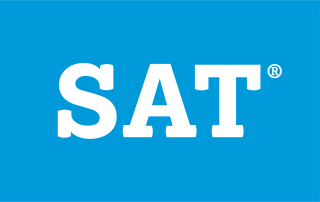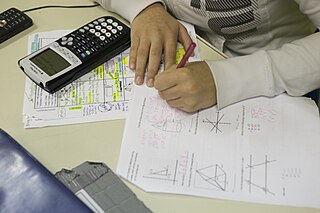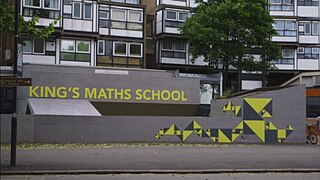
The SAT is a standardized test widely used for college admissions in the United States. Since its debut in 1926, its name and scoring have changed several times. For much of its history, it was called the Scholastic Aptitude Test and had two components, Verbal and Mathematical, each of which was scored on a range from 200 to 800. Later it was called the Scholastic Assessment Test, then the SAT I: Reasoning Test, then the SAT Reasoning Test, then simply the SAT.
The Leaving Certificate Examination, commonly referred to as the Leaving Cert or (informally) the Leaving, is the final exam of the Irish secondary school system and the university matriculation examination in Ireland. It takes a minimum of two years' preparation, but an optional Transition Year means that for those students it takes place three years after the Junior Cycle examination. These years are referred to collectively as "The Senior Cycle". Most students taking the examination are aged 16–19; in excess of eighty percent of this group undertake the exam. The Examination is overseen by the State Examinations Commission. The Leaving Certificate Examinations are taken annually by approximately 60,000 students.

A comprehensive school is a secondary school for pupils aged 11–16 or 11–18, that does not select its intake on the basis of academic achievement or aptitude, in contrast to a selective school system where admission is restricted on the basis of selection criteria, usually academic performance. The term is commonly used in relation to England and Wales, where comprehensive schools were introduced as state schools on an experimental basis in the 1940s and became more widespread from 1965.
Nicholas Chamberlaine School is a coeducational secondary school and sixth form with an academy status, located in the town of Bedworth, Warwickshire, England. It has approximately 1,400 pupils between the ages of 11 and 18.
Education in Vietnam is a state-run system of public and private education run by the Ministry of Education and Training. It is divided into five levels: preschool, primary school, secondary school, high school, and higher education. Formal education consists of twelve years of basic education. Basic education consists of five years of primary education, four years of secondary education, and three years of high school education. The majority of basic education students are enrolled on a daily basis. The main goals are general knowledge improvement, human resources training and talent development.

The International General Certificate of Secondary Education (IGCSE) is an English language based secondary qualification similar to the GCSE and is recognised in the United Kingdom as being equivalent to the GCSE for the purposes of recognising prior attainment. It was developed by Cambridge Assessment International Education. The examination boards Edexcel, Learning Resource Network (LRN), and Oxford AQA also offer their own versions of International GCSEs. Students normally begin studying the syllabus at the beginning of Year 10 and take the test at the end of Year 11. However, in some international schools, students can begin studying the syllabus at the beginning of Year 9 and take the test at the end of Year 10.

The Oklahoma School of Science and Mathematics (OSSM) is a two-year, public residential high school located in Oklahoma City, Oklahoma. Established by the Oklahoma state legislature in 1983, the school was designed to educate academically gifted high school juniors and seniors in advanced mathematics and science. OSSM opened doors to its inaugural class in 1990. It is a member of the National Consortium of Secondary STEM Schools (NCSSS).
In New York State, Regents Examinations are statewide standardized examinations in core high school subjects. Students were required to pass these exams to earn a Regents Diploma. To graduate, students are required to have earned appropriate credits in a number of specific subjects by passing year-long or half-year courses, after which they must pass at least five examinations. For higher-achieving students, a Regents with Advanced designation and an Honors designation are also offered. There are also local diploma options.

The Mathematical Institute is the mathematics department at the University of Oxford in England. It is one of the nine departments of the university's Mathematical, Physical and Life Sciences Division. The institute includes both pure and applied mathematics and is one of the largest mathematics departments in the United Kingdom with about 200 academic staff. It was ranked as the top mathematics department in the UK in the 2021 Research Excellence Framework. Research at the Mathematical Institute covers all branches of mathematical sciences ranging from, for example, algebra, number theory, and geometry to the application of mathematics to a wide range of fields including industry, finance, networks, and the brain. It has more than 850 undergraduates and 550 doctoral or masters students. The institute inhabits a purpose-built building between Somerville College and Green Templeton College on Woodstock Road, next to the Faculty of Philosophy.
The A-level is a main school leaving qualification of the General Certificate of Education in England, Wales, Northern Ireland, the Channel Islands and the Isle of Man. It is available as an alternative qualification in other countries, where it is similarly known as an A-Level.

Mathematics education in the United States varies considerably from one state to the next, and even within a single state. However, with the adoption of the Common Core Standards in most states and the District of Columbia beginning in 2010, mathematics content across the country has moved into closer agreement for each grade level. The SAT, a standardized university entrance exam, has been reformed to better reflect the contents of the Common Core. However, many students take alternatives to the traditional pathways, including accelerated tracks. As of 2023, twenty-seven states require students to pass three math courses before graduation from high school, while seventeen states and the District of Columbia require four. A typical sequence of secondary-school courses in mathematics reads: Pre-Algebra, Algebra I, Geometry, Algebra II, Pre-calculus, and Calculus or Statistics. However, some students enroll in integrated programs while many complete high school without passing Calculus or Statistics. At the other end, counselors at competitive public or private high schools usually encourage talented and ambitious students to take Calculus regardless of future plans in order to increase their chances of getting admitted to a prestigious university and their parents enroll them in enrichment programs in mathematics.

Specialist schools in the United Kingdom are schools with an emphasis or focus in a specific specialised subject area, which is called a specialism, or alternatively in the case of some special schools in England, in a specific area of special educational need. They intend to act as centres of excellence in their specialism and, in some circumstances, may select pupils for their aptitude in it. Though they focus on their specialism, specialist schools still teach the full curriculum. Therefore, as opposed to being a significant move away from it, the specialism is viewed as enriching the original curricular offer of the school.

The Integration Bee is an annual integral calculus competition pioneered in 1981 by Andy Bernoff, an applied mathematics student at the Massachusetts Institute of Technology (MIT). Similar contests are administered each year in many universities and colleges across the United States and in a number of other countries.

SAT Subject Tests were a set of multiple-choice standardized tests given by The College Board on individual topics, typically taken to improve a student's credentials for college admissions in the United States. For most of their existence, from their introduction in 1937 until 1994, the SAT Subject Tests were known as Achievement Tests, and until January 2005, they were known as SAT II: Subject Tests. They are still commonly known by these names. Unlike the Scholastic Aptitude Test (SAT) that the College Board offers, which are intended to measure general aptitude for academic studies, the Achievement Tests are intended to measure the level of knowledge and understanding in a variety of specific subjects. Like the SAT, the scores for an Achievement Test range from 200 (lowest) to 800 (highest).

University Collegiate School is a mixed secondary school in central Bolton, England, now classed as a free school. It opened in 2015 on a new site on the University of Bolton campus as Bolton UTC, a university technical college for students aged 14–19; in September 2020 it was renamed and began accepting students at age 11.
Exeter Mathematics School is a maths school located in Exeter in the English county of Devon.

King's College London Mathematics School, also known as King's Maths School or KCLMS, is a maths school located in the Lambeth area of London, England. King's College London Mathematics School is run in partnership with King's College London to provide high quality mathematics education in London. The school was inspired by the Kolmogorov Physics and Mathematics School in Moscow, established in 1965 by mathematician Andrey Kolmogorov. The school aims to widen participation in the mathematical sciences by supporting young people from backgrounds currently under-represented in these fields.

Nottingham University's Academy of Science and Technology (NUAST) is an 11 to 19 free school with STEM specialist status in Nottingham, England.

A maths school is a type of specialist free school sixth form college in England which specialises in the study of mathematics. Each maths school is sponsored by a university and, frequently, also a nearby established sixth form college or multi-academy trust. All students in a maths school must follow a course of study that includes A-Levels in mathematics and further mathematics.
Lancaster University School of Mathematics, also known as LUSoM, is a maths school located in Preston, Lancashire, England. As a maths school, it is a specialist mathematics free school sixth form college.














